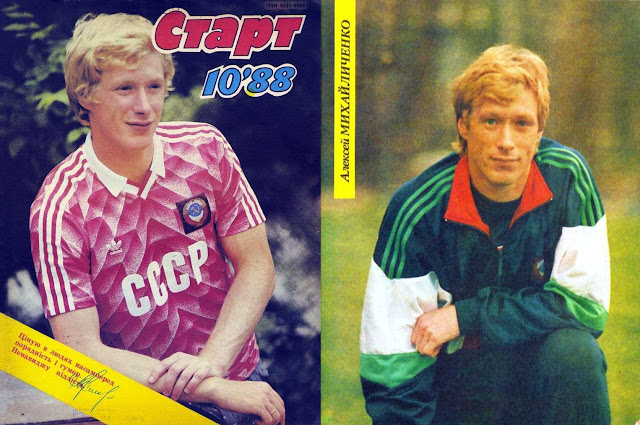October 01, 1988
Olympic Stadium
Seoul, South Korea
Seoul, South Korea
73.000 spectators
Referee: Gerard Biguet (France)
Brazil:Taffarel, Luiz Carlos, Andre Cruz, Aloisio, Jorginho, Andrade, Milton, Neto (74' Edmar), Careca, Bebeto (75' Joao Paulo), Romario.
USSR:Kharine, Ketashvili, Yarovenko, Gorlukovich, Losev, E. Kuznetsov, Dobrovolsky, Mikhailichenko, Tatarchuk, Liuty (116' Sklyarov), Narbekovas (46' Y. Savichev).
 Brazil and the Soviet Union will bring strongly contrasting styles to october 01, 1988 Olympic gold-medal game.
Brazil and the Soviet Union will bring strongly contrasting styles to october 01, 1988 Olympic gold-medal game.For Brazil its second straight final at the Games offers a test for a squad carrying part of the country's hopes for the 1990 World Cup in Italy. Brazil has never won at the Olympics, having lost the 1984 final to France, 2-0, at the Rose Bowl.
The Soviet Union, a soccer force that often falters before reaching the very top, won the Olympic gold in 1956.
In addition to its gold in 1956, the Soviet Union has won the soccer bronze at the 1972, 1976 and 1980 Olympics. The medal-dominating Soviets attach great importance to the Games, and a soccer gold - silver already is certain - would add to the luster.
In addition to its gold in 1956, the Soviet Union has won the soccer bronze at the 1972, 1976 and 1980 Olympics. The medal-dominating Soviets attach great importance to the Games, and a soccer gold - silver already is certain - would add to the luster.
The match-up is perhaps the most interesting outcome of the semifinal pairings West Germany-Brazil and Soviet Union-Italy. It is only the third intercontinental final in Olympic history.
Despite missing several players held back by clubs, Brazil's team has done well, with its play built on technically gifted individuals and sudden offensive surges from a virtual standstill. Romario is the tournament's joint-leading goalscorer with six goals in five games.
 And the defense, not usually a Brazilian strong point, has the best record in the tournament. Goalkeeper Taffarel, 22, is also the regular national team goalie.
And the defense, not usually a Brazilian strong point, has the best record in the tournament. Goalkeeper Taffarel, 22, is also the regular national team goalie."We hope this team will make up about 60% of our World Cup team," coach Carlos Alberto Silva said of the Olympic squad role in Brazilian planning. The others include stars lured away by top foreign clubs such as Portugal's Benfica, he said.
 Though Olympic soccer remains the World Cup's poor cousin, a victory would boost Brazilian morale for the qualifying round of the 1990 world championship.
Though Olympic soccer remains the World Cup's poor cousin, a victory would boost Brazilian morale for the qualifying round of the 1990 world championship.Asked whether Soviet star Alexei Mikhailichenko would be a threat, Romario said seriously, "Who's that?" :)
Mikhailichenko, a nominal midfielder whose forays frequently produce goals, is the Soviet Olympic squad's nerve center and a member of the national team that was beaten in last June's European Championship final by the Dutch.

With its World Cup players excluded under Olympic tournament rules, the Soviets have brought essentially a reserve national team, exhibiting the standard virtues of toughness, athletic power and straight-ahead play. In the semifinals, the Soviets basically waited for Italy to tire in overtime before scoring the decisive goals.
The road to the final:
USSR vs. South Korea | 0–0 | Brazil vs. Nigeria | 4-0 |
USSR vs. Argentina | 2–1 | Brazil vs. Australia | 3-0 |
USSR vs. USA | 4-2 | Brazil vs. Yugoslavia | 2-1 |
USSR vs. Australia | 3-0 | Brazil vs. Argentina | 1-0 |
USSR vs. Italy | 3-2 (aet) | Brazil vs. West Germany | 1-1 (3-2) |
1sthalf (duration 00:45:14)
2ndhalf (duration 00:45:45)
Overtime (duration 00:33:59)
Video Codec H264/AVC, MKV 768 х 576, Bitrate 1800 kbps, 25.00 fps Sound Codec mp3, 128 kbps, 44100 Hz, 16 bit, 2 channels Italian / English Comments
Links:



.jpg)





































